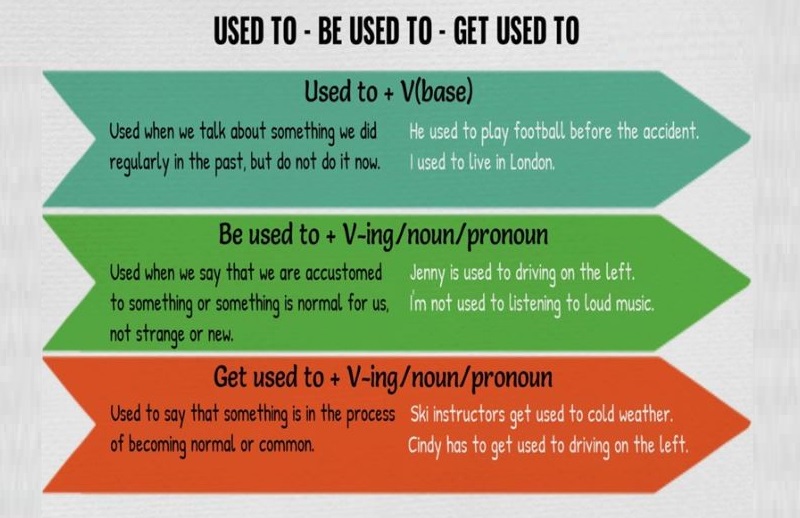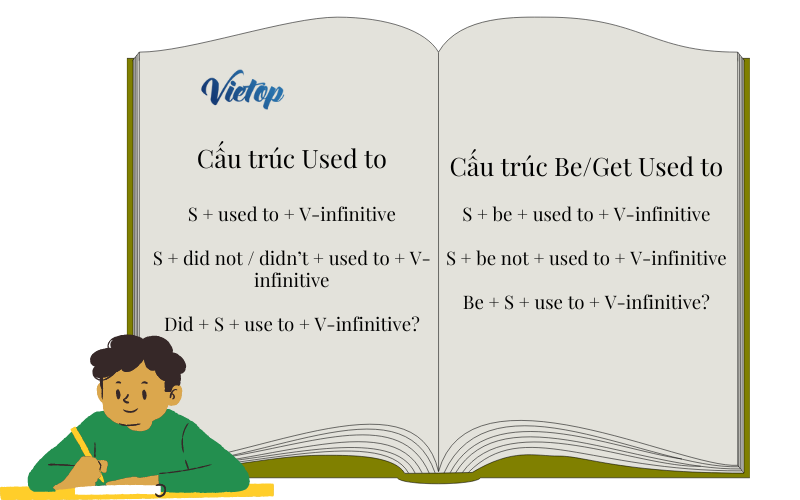Khi học tiếng Anh, chúng ta hẳn cũng đã nghe đến Used to – một cấu trúc ngữ pháp rất phổ biến dùng để chỉ về một thói quen của ai đó trong quá khứ. Tuy nhiên, không ít người học rất dễ nhầm lẫn cấu trúc này với 2 cấu trúc tương tự là Be/Get used to.
Trong bài viết hôm nay, IELTS Vietop sẽ cùng các bạn hệ thống lại kiến thức về các cấu trúc này qua một số bài tập cấu trúc Used to và Be/Get used nhỏ nhé!

Cấu trúc Used to
Công dụng
Ta dùng cấu trúc used to để:
- Nhắc đến thói quen, sự kiện, trạng thái trong quá khứ nhưng không còn được duy trì đến hiện tại
- Khi muốn nhấn mạnh vào sự khác biệt giữa hiện tại và quá khứ.
Vì thế bạn cần lưu ý rằng ta sẽ không có thì hiện tại của cấu trúc này trong tiếng Anh, nghĩa là sẽ không có cấu trúc “use to”.
Công thức
- Khẳng định: S + used to + V-infinitive
- Phủ định: S + did not / didn’t + used to + V-infinitive
- Nghi vấn: Did + S + use to + V-infinitive?
E.g.: When I was young, I used to play with dolls, but I don’t anymore. (Khi tôi còn nhỏ, tôi thường chơi với búp bê, nhưng tôi không còn chơi nữa.)
I didn’t use to like broccoli when I was younger, but I love it now. (Tôi đã từng không thích bông cải xanh khi tôi còn nhỏ, nhưng bây giờ thì tôi thích lắm.)
Did you use to smoke? (Anh có từng hút thuốc không vậy?)
Xem thêm: Khóa học IELTS Online – Học trực tuyến cùng chuyên gia IELTS 8.5

Nhận tư vấn miễn phí khóa học hè
Cấu trúc Be used to
Công dụng
Ta dùng cấu trúc Be used to để: Diễn tả ai đó đã làm một việc gì đó nhiều lần và đã có kinh nghiệm, quen thuộc với việc đó và không còn lạ lẫm nữa.
Công thức
- Khẳng định: S + be + used to + V-infinitive
- Phủ định: S + be not + used to + V-infinitive
- Nghi vấn: Be + S + use to + V-infinitive?
Bạn lưu ý rằng chúng ta sẽ chia động từ to be theo chủ ngữ và ngữ cảnh nhé!
E.g.: When we lived in Bangkok, we were used to hot weather. (Khi chúng tôi sống ở Bangkok, chúng tôi đã quen với thời tiết nóng bức.)
He isn’t used to New York. (Anh ta chưa quen với New York.)
Are you used to eating quickly? (Bạn đã quen với việc ăn nhanh rồi?)
Cấu trúc Get used to
Công dụng
Ta dùng cấu trúc này để: Diễn tả hoặc nhấn mạnh việc ai đó đã quen với điều gì, hành động gì.
Công thức
- Khẳng định: S + (modal verb) + get used to + V-ing/N
- Phủ định: S + auxiliary verb/ modal verb + not + get used to + V-ing/N
- Nghi vấn: Auxiliary verb/ Modal verb + S + get used to + V-ing/ N?
Bạn lưu ý rằng chúng ta sẽ chia động từ get theo chủ ngữ và ngữ cảnh nhé!
E.g.: I’m finding this new job hard but I’m sure I’ll get used to it soon. (Tôi thấy công việc mới này thật khó khăn nhưng tôi chắc chắn rằng mình sẽ sớm làm quen với nó.)
I haven’t got used to taking the bus to work yet. (Tôi vẫn chưa quen với việc đi xe buýt đến chỗ làm.)
Have you got used to driving on the left yet? (Bạn có quen với việc lái xe bên tay trái chưa?)
Bài tập cấu trúc Used to và Be/Get used to có đáp án

Bài 1: Make an affirmative sentence, negative sentence or question using “Used to” structure
- I / live in a cottage when I was a child.
- They / go to the beach every summer?
- My sister / love eating chocolate, but now she hates it.
- He / not / smoke.
- I / play basketball when I was at school.
- She / be able to speak French, but she has forgotten it all.
- He / play tennis every weekend?
- Both Mandy and Alex / have short hair.
- Adam / study Chinese at university.
- 10. I / not / hate going to school.
Bài 2: Make sentences using “be used to” structure
- I (live) in Tokyo, so the crowds don’t bother me.
- Amy (the subway) so she doesn’t get lost.
- He (not / deal) with animals, so he’s a bit scared of the dogs.
- Adam (drive) in heavy traffic.
- I (wake) up in the night. I drink lots of coffee!
- It was very hard to get up at five when I first started this job, because I (not / it).
- She (drink) a lot of coffee, so she doesn’t have a problem with going to sleep afterwards.
- I’ve lived in Canada for years but I (not / the snow).
- Jason (do) a lot of exercises, so a ten-mile walk is easy for him.
- Her flat is in the centre of Paris. When she visits a friend in the countryside, it’s difficult for her to sleep because she (not / the quiet).
Bài 3: Complete the sentence using Used to, Be used to or Get used to structure
- When my friends and I were younger, we rafting every _______ summer. (go)
- I have three lectures per day. I so much so I have _______ even got a sore throat. (not speak)
- I _______ sweets but now I can eat tons of them. (not like)
- We will never _______ traditions so people in this place will never become our good friends. (follow)
- My little son to school so he is happy every morning _______ when we take him there. (go)
- Monique has never worn high heels but now she started working as a model so she needs to _______ them. (wear)
- Ted _______ a bike without a helmet so he feels uncomfortable while wearing it. (ride)
- Gloria _______ a lot of questions when she was younger but now she can find all the information on the Internet. (ask)
- My friends _______ for me so I can be late for half an hour or so. (wait)
- Douglas _______ so much homework so going to this specialized school is a true disaster for him. (not do)
- Daisy has to her parents about the house regularly _______ because they are getting older each year. (help)
- Dan can’t _______ 8 hours at night — he didn’t have a chance to do it when he was a student. (sleep)
- We _______ more often before you changed job. You are so busy now. (meet)
- You don’t feel well these days because you _______ long hours. (not work)
- My girlfriend is British, so she _______ on the right. (not drive)
Bài 4: Choose the correct answer
- I like it now, but I ____.
- didn’t use to
- didn’t used to
- Zemo find it hard _____ to the dark evenings in winter.
- used
- get used
- to get used
- It took Anna a while to get used to ____ on a continental keyboard.
- type
- typing
- I _____ to being spoken to like that!
- am not used
- don’t get used
- used
- I ____ play football on Fridays when I was at school.
- was used to
- used to
- Before Mandy started cycling, she _____ go to work by bus.
- used to
- got used to
- They haven’t studied for ages and they are finding it hard to get used to _____ every day.
- study
- studied
- studying
- I couldn’t _____ used to the food.
- because
- get
- Andy never _____ behave like that.
- used
- used to
- It’s taking me a long time to ____ speaking Japanese when I moved to Tokyo.
- used to
- get used to
Bài 5: Complete the sentence using Used to structure
- I ________ (swim) a lot when I was younger.
- Alain ________ (not eat) vegetables, but now he eats them.
- ________ (they / have) a sports car?
- That building ________ (be) a cinema, but it’s closed down.
- We ________ (not like) maths lessons – our teacher was horrible!
- Where ________ (you / go) to school?
- Mr. Smith ________ (live) next door to me.
- I ________ (not enjoy) studying, but I do now.
Bài 6: Complete the sentence using Used to, Be used to or Get used to structure
- When I started to work here I needed a lot of help, but now I (do) all the work on my own.
- Alex (read) several books a month, but he doesn’t have time anymore.
- We were surprised to see her driving – she (drive) when we first met her.
- I’m afraid I’ll never (live) in this place. I simply don’t like it and never will.
- Whenever we came to Coventry we always (stay) in the Central Hotel. We loved it.
- When Pete Smith was the head of our office everything (be) well organized. Now it’s total chaos here.
- Mr. Brown was shocked when he joined our busy company because he (do) much work every day.
- We (live) there when I was a child.
Bài 7: Complete the text with the words provided below
| didn’t use ; getting ; got used ; live ; living ; the people ; there ; to be ; to know ; usually |
A few years ago, we used to 1. ______ in a very small flat in a very poor area. We were used to 2. ______ with very little. We 3. ______ to have good furniture or a good TV, and of course, we didn’t use 4. ______ what it was to have an internet connection. In our neighbourhood, the streets used 5. ______ dark and dirty, and 6. ______ used to be a lot of robberies.
Then we won the lottery and everything changed for us. We bought a new flat in a very nice area of the city, where we have been living for the last three years. We 7. ______ to sleeping in comfy beds and eating good food very quickly, but it wasn’t so easy to get used to 8. ______. They are the kind of people who don’t 9. ______ talk to each other and they are used to 10. ______ everything very easily. We share the same neighbourhood but we don’t share the same values.
Đáp án
Bài 1
- I used to live in a cottage when I was a child.
- Did they use to go to the beach every summer?
- My sister used to love eating chocolate, but now she hates it.
- He didn’t use to smoke.
- I used to play basketball when I was at school.
- She used to be able to speak French, but she has forgotten it all.
- Did he use to play tennis every weekend?
- Both Mandy and Alex used to have short hair.
- Adam used to study Chinese at university.
- I didn’t use to hate going to school.
Bài 2
- I’m used to living in Tokyo, so the crowds don’t bother me.
- Amy’s used to the subway so she doesn’t get lost.
- He’s not used to dealing with animals, so he’s a bit scared of the dogs.
- Adam’s used to driving in heavy traffic.
- I’m used to waking up in the night with my baby. I drink lots of coffee!
- It was very hard to get up at five when I first started this job because I wasn’t used to it.
- She’s used to drinking a lot of coffee, so she doesn’t have a problem with going to sleep afterwards.
- I’ve lived here in Hokkaido for three years but I’m still not used to the snow.
- Jason’s used to doing a lot of exercises, so a ten-mile walk is easy for him.
- Her flat is in the centre of Paris. When she visits a friend in the countryside, it’s difficult for her to sleep because she’s not used to the quiet.
Bài 3
- used to go
- am not used to speaking
- didn’t use to like
- get used to following
- is used to going
- get used to wearing
- is used to riding
- used to ask.
- are used to waiting
- isn’t used to doing
- get used to helping
- get used to sleeping
- used to meet
- aren’t used to working
- isn’t used to driving
Bài 4
- didn’t use to
- to get used
- typing
- am not used
- used to
- used to
- studying
- get
- used to
- get used to
Bài 5
- used to swim
- didn’t use to eat
- Did they use to have
- used to be
- didn’t use to like
- did you use to go
- used to live
- didn’t use to enjoy
Bài 6
- am used to doing
- used to read
- didn’t use to drive
- get used to living
- used to stay
- used to be
- wasn’t used to
- used to live
Bài 7
- live
- living
- didn’t use
- to know
- to be
- there
- got used
- the people
- usually
- getting
Xem thêm các bài tập khác:
Hy vọng sau khi tham khảo bài viết và làm qua các bài tập trên, các bạn đã nắm vững hơn về các cấu trúc ngữ pháp Used to và Be/Get used to trong tiếng Anh. Vietop chúc các bạn học tốt và hẹn các bạn ở những bài viết sau!











